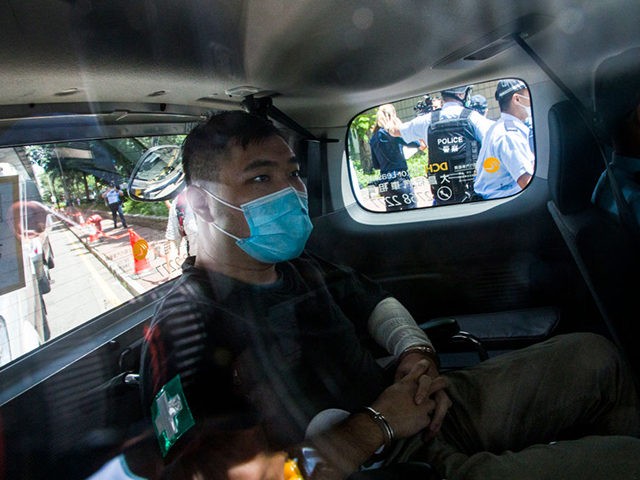The High Court of Hong Kong on Tuesday handed down the first guilty verdict under the draconian “national security law” that Beijing imposed last Summer to crush the pro-democracy movement and criminalize dissent.
The defendant, 24-year-old Tong Ying-kit, was found guilty of “terrorism” and “incitement to secession.”
Tong, who pleaded not guilty to the charges, could face life imprisonment after his conviction by a three-judge tribunal. The Hong Kong Free Press (HKFP) on Tuesday described his brisk trial and inevitable conviction:
Tong was arrested on July 1 last year, after he rode a motorcycle displaying a “Liberate Hong Kong, revolution of our times” protest flag into three policemen during a demonstration in Wan Chai. In a departure from the common law tradition, he was denied bail and a jury.
Tong’s 15-day trial, which concluded last Tuesday, saw the prosecution and defence call three academics to debate the meaning of the protest slogan, which was banned by the government a day after Tong’s arrest for carrying connotations of “pro-independence, secession and subversion.”
In handing down the verdict, Madam Justice Toh — who was handpicked by Chief Executive Carrie Lam to handle national security cases — said that, in the particular circumstances where Tong displayed the “Liberate Hong Kong” slogan, such a phrase was capable of inciting others to commit secession.
Much of Tong’s trial centered on debating if the famed slogan of the pro-democracy protesters was inherently “seditious” and “secessionist.” The part about him ramming a motorcycle into three police officers was literally an afterthought — an “alternative offense to the terrorism charge.” The prosecution made a show of introducing the actual flag Tong carried as evidence against him.
When they announced their verdict, the judges said prosecutors did such a thorough job of proving Tong was a secessionist terrorist that there was no need to proceed with the dangerous driving charges. The incident for which Tong was charged with terrorism and secession occurred on July 1, 2020, less than 24 hours after the national security law went into effect.
The trial brought forth witnesses such as Lingnan University history professor Lau Chi-pang to argue that “Liberate Hong Kong, Revolution of Our Times” is a slogan with the primary “objective of separating the [Hong Kong Special Administrative Region] from the People’s Republic of China.”
The prosecution argued that the slogan means “rejecting the governance of the PRC and the HKSAR, and attempting to replace the current regime or social system by way of changing the regime or social system,” which is another way of saying that democracy is inherently seditious.
The defense contended that, like all punchy and memorable slogans, the exact meaning of “Liberate Hong Kong” was subjective.
In one interesting passage from the trial, defense witness Professor Eliza Lee of the University of Hong Kong sparred with prosecutor Anthony Chau over if America’s Malcolm X — an inspiration for the creator of the “Liberate Hong Kong” slogan, 2016 political candidate Edward Leung — would have been considered a secessionist and prosecuted for treason under the Hong Kong national security law.
Chau later contended that studying “ancient Chinese history” and 1,000-year-old Chinese texts provided the necessary context for understanding Tong’s slogan as purely secessionist demand, and since Lee and fellow defense witness Francis Lee, a journalism scholar, were not experts in Chinese history, their testimony should be disregarded.
Tong’s legal representative, assigned by the Hong Kong Legal Aid Department, was barrister Lawrence Lau, who himself is facing charges of subversion under the national security law for supporting the pro-democracy movement.
Tong mounted a legal challenge against the decision to try him under a tribunal of handpicked pro-Beijing judges instead of a jury, but his challenge was rejected on the grounds that trial by jury was not an “indispensable element” of his right to a fair trial.
The prosecution came back to Tong’s dangerous driving in its closing arguments, bizarrely contending that he was trying to coerce the people of Hong Kong into separating from China by intimidating them with his motorcycle and flag, which could have become a road hazard if he had dropped it.
The defense countered that Tong actively “avoided running into police” during his motorcycle ride, and only collided with the three officers at the end of his ride because he was struck by a police riot shield.
“To convict Tong Ying-kit of ‘secession’ for displaying a flag bearing a widely used political slogan is a violation of international law, under which expression must not be criminalized unless it poses a concrete threat. This feels like the beginning of the end for freedom of expression in Hong Kong,” said Amnesty International Asia-Pacific Director Yamini Mishra in response to the verdict on Tuesday.
Mishra saw the ruling as an “ominous” omen for the hundred other demonstrators detained under the national security law.
“People should be free to use political slogans during protests, and Tong Ying-kit should not be punished for exercising his right to free speech,” she declared.
Hong Kong democracy activist Nathan Law, now living under asylum in the United Kingdom, said the Tong verdict shows Hong Kong’s judicial system has been “weaponized to suppress.”
“This is a political show trial. The government handpicked the judges so that the result of the trials can best serve the political interest of the government,” Law said.
“This is another perfect example of Beijing making use of common-law procedures and the veneer of an independent judiciary to suppress dissidents by turning them into terrorists,” said Glacier Kwong, a research fellow at the Hong Kong Democracy Council.

COMMENTS
Please let us know if you're having issues with commenting.